- Home
- Tad Williams
Shadowplay Page 19
Shadowplay Read online
Page 19
The passersby might not look at him, but Vo looked at them. He was a spy by nature, curious in a mildly contemptuous way as always about crea-tures that seemed to him like another species from himself, things that wore their emotions as openly as their clothes, faces that reflected fear and anger and something he had come to recognize as joy, although he could not connect it to his own more abstract pleasures. They were like apes, these ordinary folk, carrying on their private lives in the full sight of anyone with eyes to see, the adults as uncontrolled in their bleatings and grimaces as the children. In this regard the Hierosolines around him now were barely dif-ferent from the people of Xis, who did at least have the sense to clothe the revealing nakedness of their wives and daughters from foot to crown, although not for the reason Vo would have done so. Here in Hierosol the women seemed to dress any way they chose, some decently modest in loose robes and veils or scarves that covered their heads and part of their faces, but some nearly as shameless as the men, with necks, shoulders, legs, and most especially their faces exposed for all to see. Vo had seen women naked, of course, and many times at that. Like his fellow Perikalese mercenaries he had visited the brothels outside the palace’s Lily Gate many times, although in his case it had been mostly because not to do so would have attracted attention, and Vo hated attention even more than he disliked pain. He had used some of the women as they chose to be used, but after the first time, when the oddness of the experience had some value in itself, it had meant little to him. He understood that copulation was a great motivator of mankind and perhaps even womankind as well, but to him it seemed only another ape trick, different from eating and defecating only because it could not be practiced solitarily, but required company.
Vo paused, his attention returned to the ships moving placidly in the gentle tides of the bay, tied up alongside the quay like so many great cows in a barn. That one, there, with the lean bow like the snout of a hunting animal: that must be the one he sought. The name painted in sweeping Xixian characters was unfamiliar, but anyone could change a name. It was less easy to hide the shape of a ship as swift as Jeddin’s.
Daikonas Vo approached the gangway and looked up to the nearly empty deck. It could be that Dorza, her captain, was not here. If that was so, he would ask some questions and Dorza would be found. He felt confident that he could get everything else he needed from Axamis Dorza himself. It was an impossibly long coincidence that the captain should sail out from Xis in the disgraced Jeddin’s own ship on the very night of both the Leopard captain’s arrest and the disappearance of Vo’s quarry. Captain
Jeddin, despite torments that, had impressed even Vo, had denied any in volveinenl with the girl Qinnitan, but his denial seemed suspicious in itself: why would a man watching his own fingers and toes being torn loose from his body protect a girl he barely knew instead of assenting to anything the inquisitors seemed to want to hear? It certainly did not correspond with Vo’s thorough experience of humanity in its final extremes.
He shouldered his bag and walked up the gangplank of the ship that had been the Morning Star of Kirous, whistling an old Perikalese work song his father used to sing while beating him.
Since Dorza had thrown her out, it had taken Qinnitan several days and many inquiries to find this woman, the laundry mistress. In the meantime, she had found herself in a situation she had never imagined in all her life, sleeping rough in the alleys of Hierosol, eating only what the mute boy Pigeon could steal. It could have been worse, but Pigeon had proved surprisingly adept at pilfering. From what Qinnitan could grasp of his story, he had not been fed well in the autarch’s palace and he and the other young slaves had been forced to supplement their meager fare with thievery.
The citadel’s laundry was huge, a vast space that had once perhaps been a trader’s warehouse, but which now was filled not with cedar wood and spices but tubs of steaming water, dozens of them—the room, Qinnitan marveled, must exist in a permanent fog. Every tub had two or three women leaning over it, and scores more women and young boys were carrying buckets from the great cauldron set in the floor at the center of the room, which was kept continually bubbling by a fire in the basement. As Qinnitan watched, one of the girls slopped water over the edge of a bucket onto herself and then collapsed to the ground, shrieking. A woman of middle years, impressively thick-limbed but not fat, came over to examine the hurt girl, then gave her a cuff on the head and sent her off with two other washwomen before directing a third to take the bucket which the injured girl had somehow miraculously not dropped. The big woman stood with her hands on her hips and watched the wounded soldier being helped off the battlefield, her expression that of someone who knows that the gods have no other occupation but to fill her life with petty annoyances.
Qinnitan gestured for Pigeon to wait by the doorway. The laundry—
mistress watched her approach, scowling at this clear sign that her day was about to be unfairly interrupted again.
“What do you want?” she said in flat, unfriendly Hierosoline.
Qinnitan made a little bow, not entirely for show: up close, the woman was quite amazingly large and her sun-darkened skin made her seem some thing carved out of wood, a statue or a ship of war or something else worthy of deferential approach. “You . . . Soryaza are?” she asked, aware that her Hierosoline was barbarous.
“Yes, I am, and I am a busy woman. What do you want?”
“You . . .from Xis? Speak Xis?”
“For the love of the gods,” the woman grumbled, and then switched to Xixian. “Yes, I speak the tongue, although it’s been years since I lived in the cursed place. What do you want?”
Qinnitan took a deep breath, one obstacle passed. “I am very sorry to bother you, Mistress Soryaza. I know you are an important person, with all this . . .” She spread her hands to indicate the sea of washing-tubs.
Soryaza wasn’t so easily flattered. “Yes?”
“I ... I have lost my father and my mother.” Qinnitan had prepared the story carefully. “When my mother died of the coughing fever last summer, my father decided to bring me and my brother back here to Hierosol. But on the ship he too caught a fever and I nursed him for several months before he died.” She cast her eyes down. “I have nowhere to go, and no relatives here or in Xis who will take me and my brother in.”
Soryaza raised an eyebrow. “Brother? Are you sure you do not mean a lover? Tell the truth, girl.”
Qinnitan pointed to Pigeon. The child stood by the door with his eyes wide, looking as though he might flee at a sudden loud noise. “There. He cannot speak but he is a good boy.”
“All right, brother it is. But what in the gods’ names could this possibly have to do with me?” Soryaza was already wiping her hands on her voluminous apron, like someone who is finished with something and about to move on to the next task.
This was the risky part. “I ... I heard you were once a Hive Sister.”
Both eyebrows rose. “Did you? And what do you know of such things?”
“I was one myself—an acolyte. But when my mother was dying I left the Hive to help her. They would have let me come back, I’m certain, but my father wanted me here in Hierosol, his home.” She let a little of the very real tension and fear mount up from inside her, where she had kept it care—
fully bottled for so long. Her voice quivered and her eyes filled with tears. “And now my brother and I must sleep in the alleyways by the harbor, and men . . . men try . . .”
Soryaza’s brown face softened a little, but only a little. “Who was the high priestess when you were there? Tell me, girl, and quickly.”
“Rugan.”
“Ah, yes. I remember when she was merely a priestess, but she had a head on her shoulders.” She nodded. “Do the priests still come into the Hive every morning to collect the sacred honey?”
Qinnitan stared, surprised by such a strange, illogical question. Had things changed so much since this woman’s days as a priestess? Then she realized she was still being tested. “No, Mi
stress Soryaza,” she said carefully. “The priests never come in.... except for a few Favored who tend the altar of Nushash, that is. No true men do. And the honey only goes to the priests twice a year.” The amount sent in the winter ceremony was slight, only enough taken from the jars covered with holy seals to symbolize the light of the magnificent, holy sun that would survive the cold months and return again. Then, in summer, the high priestess herself and her four Carriers always took the wagon filled with jars of sacred honey to the high priest of Nushash during the important ceremony of Queening, when the new hives were begun and the weariest of the old hives were sacrificed to the flames. The high priest took that honey and presented it to the autarch, or so it was told: Qinnitan and the other acolytes never saw any of the ceremonies that took place outside the Hive, even one so important as the delivery of the god’s honey.
“And the Oracle?”
“Mudri, Mistress. She spoke to me once.” But that was telling more than she needed to. Fortunately, Soryaza didn’t seem to notice.
“Ah, Mudri, was it? Hands of Surigali, she was there when I was a girl and she was old then.”
“They say she has outlived four autarchs.”
“The gods bless her and keep her, then. One autarch was enough for me, and now I hear there’s a new one who means even less good than his father.”
Qinnitan flinched at this casual blasphemy, so trained was she in the decorous and unthinking autarch-praise of the Seclusion. Still, she thought, I could tell her things about this autarch that would freeze her blood. She felt a small thrill of power even as the memories brought a rush of fear. She had survived—she, Qinnitan, had escaped. Had any other wife ever left the Seclusion except in a casket?
“Well, then, I believe your story, child,” Soryaza said. “I will find work for you. You can sleep with the other girls, those who live here—some stay nights with their families. But you will work, I promise you! Harder than you’ve ever done. The Hive is a dream of paradise compared to the palace laundries.”
“What about my ... my brother?”
Soryaza regarded the boy sourly. He straightened up in an effort to look useful, even though from such a distance he could have no idea what was being discussed. “Is he clean? Does he have decent habits—or has he been allowed to run wild like most simpleminded children?”
“He’s not simpleminded, Mistress, just mute. In truth, he’s very clever, and he will work hard.”
“Hmmmph. We’ll see. I suppose I can find a few things for an able child to turn his hand to.”
“You are very kind, Mistress Soryaza. Thank you so much. We won’t give you any cause to regret ...”
“I have regrets enough already,” the laundry-mistress said. “More if you don’t stop chattering. Go with Yazi—the one with the red arms, there. She’s a southerner, too. She’ll show you what to do.” She turned to leave, then stopped and looked Qinnitan over, a disconcertingly shrewd appraisal. “There’s more than you’re telling me, of course. I can hear from your way of speaking, though, that the part about the Hive is true. No poor girl gets a place there, and no poor girl ever spoke like you. You’ll have to learn to talk proper Hierosoline, though—you can’t get away with Xixian here, someone will knock your head in. They don’t care much for the autarch in this city.”
“I will, Mistress!”
“What’s your name?”
Qinnitan s mouth fell open. With all the talk about the Hive, she had forgotten the false name she had chosen, and now it had vanished as though it had never existed. In a stretching instant that seemed hours, her mind flitted wildly from one woman’s name to another, her sisters Ashretan and Cheryazi, her friend Duny, even Arimone the autarch’s paramount wife, but then lighted on that of a girl who actually had left the Hive, an older acolyte whom Qinnitan had envied and admired.
“Nira!” she said. “Nira. My name is Nira.”
“Your name must he ‘addled,’ girl, if it takes you so long to remember. Go now, and I kid better not catch you standing around with your mouth hanging open—everyone works here.”
“Thank you again, Mistress. You have done . . .”
But Soryaza had already turned her back on Qinnitan and was on her way across the steaming laundry floor, off to deal with whatever practical joke rude Fate would next set in her path.
Axamis Dorza, sensing something wrong when no one responded to his greeting, came through the door with surprising delicacy for a big man. The captain seemed to have some idea of the pantomime Vo had prepared for him, but though he was obviously a clearheaded fellow and not to be underestimated, his eyes still grew wide when he saw the blood on the floor. When he in turn observed Dorza’s heavily muscled arms, Vo took his blade back a few finger-widths from the boy’s throat: he didn’t want things happening too quickly. If he had to kill the boy he’d lose much of his leverage; if he had to kill Captain Dorza before he could be made to speak, the entire day’s careful work would be wasted.
“What are you doing?” Axamis Dorza said hoarsely. “What do you want?”
“A few words. Some friendly conversation.” Vo slowly moved the blade back until its needle-sharp tip touched the boy’s convulsing throat. “So let us all move slowly. If you tell me what I need to know I will not harm the boy. Your son?”
“Nikos . . .” Dorza waved weakly. “Let him go. You cannot want anything from him. “
“Ah, but I can and do. I want him beside me while you answer my questions.”
The captain’s eyes darted away from his captive child, scanning the rooms for other bandits. Daikonas Vo could all but hear the man’s thoughts: Surely so confident a criminal as this one must have confederates. There were no confederates, of course, which was how Vo liked it, but it also forced caution. Dorza was a head taller than him; if Vo hurt the boy the captain would be on him like a mad bear.
Vo wanted to head off the next problem too—anything to keep the man calm as long as possible. Any moment now he would notice the body crumpled on the floor just behind the door. Better simply to tell him.
“I have bad news for you, Captain Dorza. Your wife is dead. She caught me by surprise. I did not know she was in the house. She was a brave one, it must be said. She tried to kill me with that club—a belaying pin, I think you sailors call it? So I had to kill her. I am sorry. I did not wish to do it but it is done, and ... ah, ah, careful ... if you let anger get the best of you the boy will die, too.”
“Tedora . . . !” Dorza looked around frantically, at last saw the blood-soaked shape behind the door. “You . . . you demon!” he shouted at Vo. “Nushash burn you, I’ll send you to hell!” His eyes, red with tears, widened again. “The other children .. . !”
“Are under the bed. They are safe.” Daikonas Vo prodded gently with his long blade at the boy’s gorge, eliciting a squeal of fear. “Now speak to me or this one dies, too. You carried a young woman on your ship. Some say she was Guard Captain Jeddin’s mistress. Where is she now?”
“I’ll break you ... !”
“Where is she?” He pulled the boy’s chin back until it seemed the skin of his throat, downy with his first beard, might part without even the touch of the blade.
“I don’t know, curse you! She stayed here with us but I threw her out when I found out what she was!”
“Liar.” He pinked the boy just enough to make a drop of blood grow, wobble, then slide down into the neck of his shirt.
“It’s true! She came to me with a note from Jeddin, saying to bring her here to Hierosol where he would meet us. I did not know she was the autarch’s wife!”
“And you didn’t know Jeddin was a traitor? You are surprisingly ignorant for a veteran captain.”
“I didn’t know anything until we arrived here. She hid it from me. She came with orders to leave that evening—the very evening when . .. when Jeddin was arrested.”
“I do not think I like your answer. I think I will take one of the boy’s eyes out and then we will try again.”
&n
bsp; “By the gods, I swear I have told you all I know! It was only a few days ago that I threw her out—she is doubtless still in the city! You can find her!”
“Did she know anyone here?”
“I don’t think so. That was why she stayed with me—she and the child had nowhere else.”
“A child? She had a child?”
“Not hers, he W;IS too old. A little mute boy her servant, I think.” The captain ran his thick fingers through his beard. Though it was evening, and eool, his face was running with sweat. “And that is all I know. Here, even if you kill my son I can tell you nothing more, I swear on the blood of Nushash! On the autarch’s head!”
“Swearing by the ruler you betrayed? Not a good choice of oaths, I think.” Daikonas Vo experimentally lifted his blade until it hovered just a fingernail’s breadth from the boy’s eye, but the captain only wept. It seemed he truly had nothing more to say.

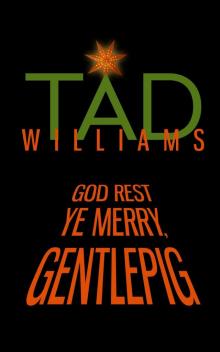 God Rest Ye Merry, Gentlepig
God Rest Ye Merry, Gentlepig Tailchaser's Song
Tailchaser's Song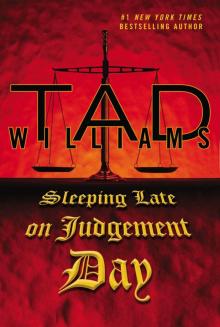 Sleeping Late on Judgement Day
Sleeping Late on Judgement Day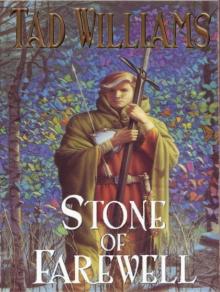 Stone of Farewell
Stone of Farewell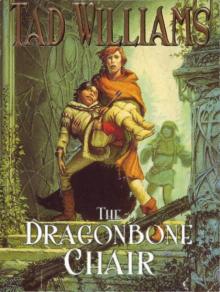 The Dragonbone Chair
The Dragonbone Chair Sea of Silver Light
Sea of Silver Light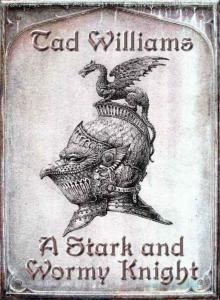 A Stark and Wormy Knight
A Stark and Wormy Knight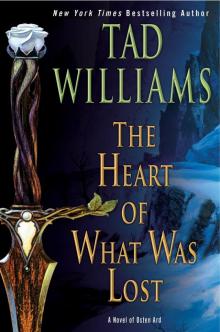 The Heart of What Was Lost
The Heart of What Was Lost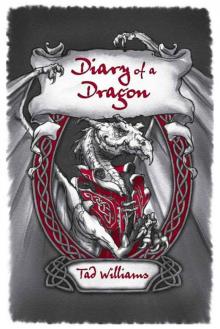 Diary of a Dragon
Diary of a Dragon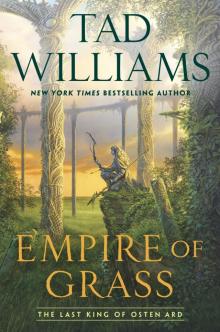 Last King of Osten Ard 02 - Empire of Grass
Last King of Osten Ard 02 - Empire of Grass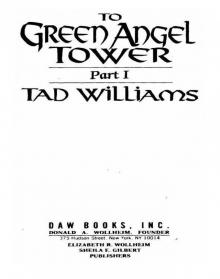 To Green Angel Tower, Volume 1
To Green Angel Tower, Volume 1 The Dirty Streets of Heaven
The Dirty Streets of Heaven River of Blue Fire
River of Blue Fire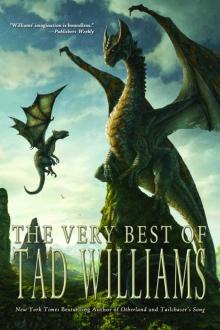 The Very Best of Tad Williams
The Very Best of Tad Williams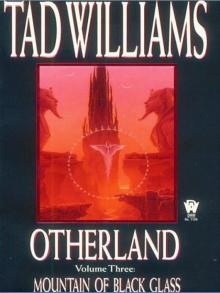 Mountain of Black Glass
Mountain of Black Glass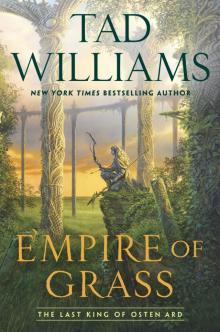 Empire of Grass
Empire of Grass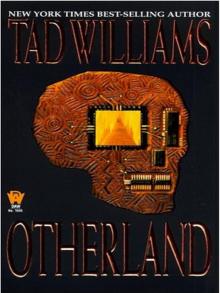 City of Golden Shadow
City of Golden Shadow Happy Hour in Hell
Happy Hour in Hell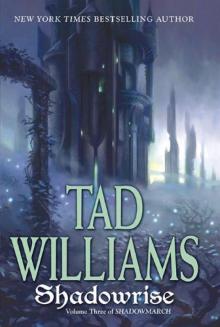 Shadowrise
Shadowrise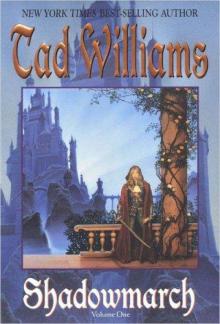 Shadowmarch
Shadowmarch Brothers of the Wind
Brothers of the Wind Shadowheart
Shadowheart Bobby Dollar 02 - Happy Hour In Hell
Bobby Dollar 02 - Happy Hour In Hell The War of the Flowers
The War of the Flowers The Dirty Streets of Heaven bd-1
The Dirty Streets of Heaven bd-1 Tad Williams - The War of the Flowers (retail) (pdf)
Tad Williams - The War of the Flowers (retail) (pdf) Shadowheart s-4
Shadowheart s-4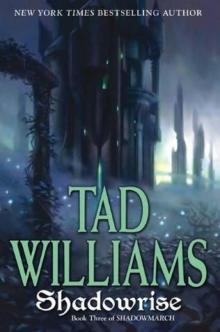 Shadowrise s-3
Shadowrise s-3 The Dirty Streets of Heaven: Volume One of Bobby Dollar
The Dirty Streets of Heaven: Volume One of Bobby Dollar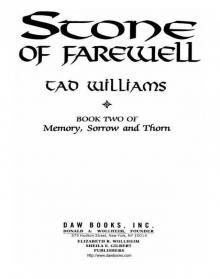 The Stone of Farewell
The Stone of Farewell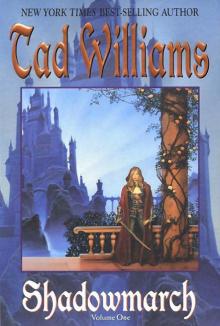 (Shadowmarch #1) Shadowmarch
(Shadowmarch #1) Shadowmarch The Secrets of Ordinary Farm of-2
The Secrets of Ordinary Farm of-2 Shadowmarch s-1
Shadowmarch s-1![Bobby Dollar [04] God Rest Ye Merry, Gentlepig Read online](http://i1.bookreadfree.com/i1/04/06/bobby_dollar_04_god_rest_ye_merry_gentlepig_preview.jpg) Bobby Dollar [04] God Rest Ye Merry, Gentlepig
Bobby Dollar [04] God Rest Ye Merry, Gentlepig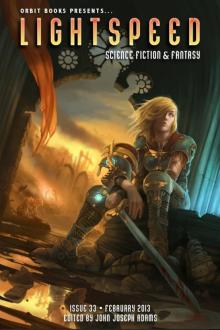 Lightspeed Issue 33
Lightspeed Issue 33 Sea of Silver Light o-4
Sea of Silver Light o-4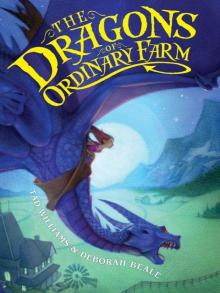 The Dragons of Ordinary Farm of-1
The Dragons of Ordinary Farm of-1 Shadowplay s-2
Shadowplay s-2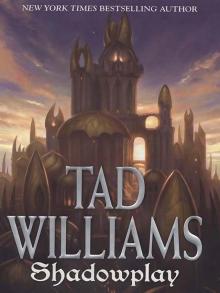 (Shadowmarch #2) Shadowplay
(Shadowmarch #2) Shadowplay